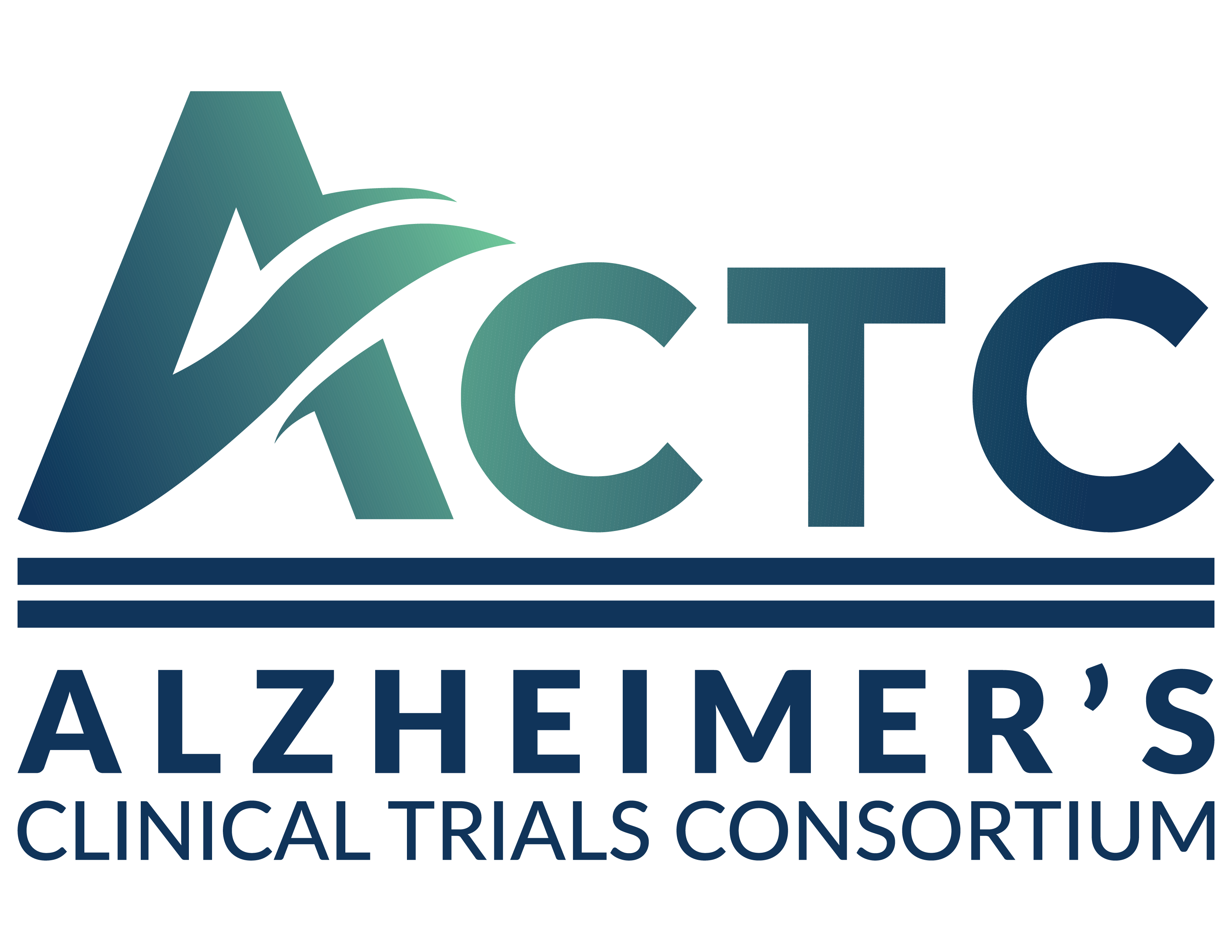Click below for more information about joining the START Study.

START STUDY
The START (Synaptic Therapy Alzheimer’s Research Trial) Study is testing an investigational treatment to see if it can help slow memory loss caused by Alzheimer’s disease (AD). Scientists believe the investigational treatment, also called the study drug, works in a different way than other drugs used to treat AD. The drug does not have a name yet, so for now it is called CT1812. It comes in the form of a capsule, and it is not approved for use outside of a research study.
GOAL OF THE STUDY
The purpose of the START Study is to test CT1812 to see if it may potentially be used to treat people with early AD.
Age
Are ages 50 to 85.
Diagnosis
Have a diagnosis of either mild cognitive impairment (MCI) due to Alzheimer’s disease or mild Alzheimer’s disease dementia.
Participation Duration
Are able and willing to agree to an 18-month commitment in the study.
Treatment
Are able and willing to take the investigational treatment or placebo daily in the form of oral capsules.
Study Partner
Have a study partner. A study partner is one or more people that have frequent contact with the study participant and agree to take part in information-based assessments in-person and by telephone.
ABOUT RESEARCH STUDIES
What is a research study?
-
- A research study tests new drugs, new medical devices, new surgical procedures, and other things that affect human health.
- The START Study is a research study testing whether the study drug (CT1812) is safe and effective for use in humans
- Every study drug goes through the research study process. Participants are given specific medical treatments and researchers closely watch the results to help decide if the drug should be approved for wider use.
- People in the study play a very important role in advancing medicine for others
Who runs research studies?
To help make sure a research study is ethical and that your rights are protected, in the U.S. an Institutional Review Board (IRB) reviews and approves rules on how the study is run. There are also teams who visit the study sites to make sure the study is being run in the correct way, according to the approved rules.
Why is diversity important?
If a study does not include people of diverse backgrounds, we cannot know for sure if a study drug works for everyone. Studies only show if a drug works for the people who are in that study. It might not work the same in people of different races, ethnicities, ages, or sexes if not tested within these groups.
What is a study drug?
A study drug is not yet approved for sale by any government health agency or authority. Clinical research studies, also called trials, are used to test the safety and effectiveness of a study drug.
ABOUT THE START STUDY
Why is the START Study important?
Scientists are always looking for better ways to treat Alzheimer’s disease. Trials like the START Study are an important part of this process. If you join the START Study, you will be helping researchers figure out if the study drug might be an effective treatment option for people with Alzheimer’s disease.
How do researchers decide who can be in the START Study?
Researchers use a careful screening process to evaluate people for the START Study. All studies have rules that determine eligibility. Some of these rules include:
-
- age
- other health conditions
- current medications
- participant location
The study site can give you more information about who can or cannot be in this study.
Find a Location
View Map
or call 1-833-START-33 (1-833-782-7833)
How can I see if I qualify for the START Study?
As a first step, visit the Study Locations page to find the study site closest to you. Each site has contact information so you can talk to someone who can help determine if you qualify for the START Study.
Find a Location or call 1-833-START-33 (1-833-782-7833)
If I join the START Study, will I get the study drug?
In the START Study, one-third of participants will receive a placebo. A placebo looks just like the study drug but does not have any of the study drug in it. The people who get the placebo are chosen at random and no one will know who gets it. This includes the researchers and the people who are at the study site. This is done so researchers can judge whether or not the new drug has an effect. In a study that includes placebos, everyone in the study receives the same level of medical care.
What is the length of the START Study?
The study lasts about 21 months. This includes a Screening Period that can last up to 3 months, when doctors do tests to see if you are eligible to be in the study. This is followed by the Treatment Period, which is 18 months long. There is a final visit one month after the Treatment Period.
What do I have to do while in the START Study?
You and your study partner are asked to follow the rules and instructions listed on the Informed Consent Form for the START Study.
To protect your health as much as possible, the START Study will be run by trained people under the direct supervision of the study doctor. You or your study partner will need to give all information about your past and current health during the Screening Period.
You will be asked about any changes to your health at each study visit. This includes letting your research site know if you are in any other study at the same time you are in this one.
If you or the person in the START Study has a primary care doctor, you should let him or her know you may want to be in this research study.
Does my study partner have to attend every visit with me?
Yes. Your study partner will help you with taking the study drug and help you report how you feel at each visit. They will need to attend all study visits and share information about you to make sure all the data we gather is correct and complete.
If I join the START Study and change my mind, can I quit?
Yes. Participation in the START Study is 100% voluntary. You can quit the study at any time, for any reason, with no consequences.
Tell your START Study doctor if you or your loved one are thinking about stopping or decide to stop. You should talk to the study doctor about leaving the START Study before the decision is made so the doctor can find out if you or your loved one are having any side effects from study treatment, and can explain how to safely stop taking the study drug (or placebo).
RISKS AND BENEFITS
What are some of the risks and benefits of being in the START Study?
Some possible risks of being in the START Study are:
-
- The study drug may not help you.
- You may have side effects from the study drug. Not all side effects of a study drug can be predicted, but researchers and Institutional Review Boards (IRBs) do their best to make sure they keep the risks low.
- You will have medical tests that may be uncomfortable, such as blood draws or lumbar punctures.
Some possible benefits of being in the study are:
-
- You will help researchers learn more about how the study drug affects people like you.
- You may have early access to an advanced treatment for your condition.
- Your health will be watched by the trial doctors and nurses.
How do I know the study drug is safe?
- The FDA works to protect people in clinical studies and to make sure they have good information before deciding whether to join a study.
- The U.S. government has rules and guidelines for this type of research to protect people in a study from too much risk.
- Monitors at each study site ensure that IP administration and safety is being adhered to.
- Efforts are made to control risks, though some risks may be unavoidable because we are still learning about the study drug.
The START Study is a Phase 2 study. Your study team will review the risks and benefits of the START Study and of CT1812 with you before you decide to be in the study or not.
Will my identity stay private?
-
- Yes. Federal law requires that we keep your health and personal information private, so there are security steps we take to protect every person’s personal information.
- These steps are in place to stop anyone’s personal information from getting lost, used, changed, shared, or accessed in any way that isn’t permitted. To protect the identity of each person in the study, his or her personal information will be coded with its own study number.
- More information about how we protect your privacy will be shared with anyone who chooses to be in the study.
MY CURRENT TREATMENT
Can I continue to see my primary care doctor and my other doctors?
Yes, in fact you are encouraged to continue seeing your regular doctors. While in the study, you will also get a high standard of care from the study doctors and study staff.
Should I tell my other doctors I am in a study?
Yes, you should let your other doctors know that you are in a study. If not, they may prescribe medications or other treatments that are not allowed during the START Study. Your study team can help you contact your other doctors and make sure your medical care continues.
Can I qualify for the START Study if I have other medical problems?
It is possible. Even if you have a condition like heart disease or diabetes, you may still be able to take part in the START Study. The staff at the study site can help you figure out if you qualify for the START Study.
Can I keep taking my other medications that are not for Alzheimer’s disease, like diabetes or blood pressure medications?
Maybe. If you decide to screen for the START Study, the study team will go over all of your medications and let you know if they are allowed or not. This may change your mind about wanting to be in the study, and that’s okay. Screening for the START Study does not mean you must be in the study.
Together, we can START on a new path to treating Alzheimer’s disease.
Take part in a research study testing an investigational treatment that may slow the process of memory loss caused by Alzheimer’s disease.
find and contact a study location for more information.

Find a location:
Or Call:
1-833-start-33
(1-833-782-7833)
PROCESS REVIEW DIAGRAM
What to expect during the START Study
The START Study lasts about two years. Here is an outline of study visits that each participant will be asked to make.
Visit 1:
Screening Visit(s)
Medical staff at the study site will determine if each person qualifies for the study. This is done through several different medical tests and procedures. The screening process could take up to 4 visits, and from several weeks to three months to complete.
VISIT 5:
Randomization
When a person qualifies for the study, he or she will be randomly assigned (or randomized) to a treatment group. The three possible treatment groups are: 100mg dose of CT1812, 200mg dose of CT1812, or placebo.
A placebo is a capsule that looks just like the study drug but does not contain the study drug or any other active ingredient. To ensure fairness, the person in the study, their study partner, and the study doctor will not know whether the participant is taking CT1812 or the placebo
VISIT 6-23
Treatment Period
The treatment period lasts about 18 months. During this time each participant will:
-
- Take the study drug or placebo capsule(s) once a day, as instructed by study site staff.
- Attend in-person visits for medical tests and procedures.
- Have a study partner who helps with giving the study drug to the participant and who can share information about the participant’s behavior and health to the study site staff.
- Take the study drug or placebo capsule(s) once a day, as instructed by study site staff.
VISIT 24
Follow-Up Phone Call
A final phone call four weeks after the participant takes the last dose of the study drug and the related study site visit.
Visit 1
Screening Visit(s)
Eligibility for the study will be confirmed by study site staff with the use of various medical assessments and procedures. The screening process could take several weeks to complete.
Visit 5
Visit 5-23
Treatment Period
- Take the investigational treatment or placebo capsule(s) once per day, as instructed by study site staff.
- Attend in-person visits for medical assessments and procedures.
- Keep a study partner that helps with giving the investigational treatment to the participant and provides behavior and health information about the participant to study site staff.
Visit 24
Follow-Up Visit
A final in-person visit four weeks after the last dose of the study medication and the related study visit.
What is CT1812?
The name of the investigational treatment used in the START Study is CT1812 and it will be taken as an oral capsule. If randomly selected for the placebo, it will also be taken as an oral capsule.
Previous studies have shown that CT1812 has the potential to protect against the memory loss characteristic of Alzheimer’s disease. CT1812 is believed to work by protecting synapses in the brain. Synapses are the points of communication between brain cells and are key to thinking and forming memories.
The investigational treatment is being evaluated for possible benefit in slowing down memory loss caused by Alzheimer’s disease.
Click here to find and contact a study location for more information.

Who is leading the START Study and who is funding it?
The START Study is funded by the National Institute on Aging (NIA) of the National Institutes of Health (NIH) and sponsored by Cognition Therapeutics. The study is being conducted by the NIH-funded Alzheimer’s Clinical Trial Consortium (ACTC), a network of leading academic Alzheimer’s research centers.
The study is led by Alzheimer’s disease research experts and academic leadership at the ACTC, Yale School of Medicine, and Cognition Therapeutics.
Reasons to Join
Help Determine if CT1812 is an Effective Treatment
Due to an aging population, the number of people with Alzheimer’s disease is expected to soar over upcoming years. Your participation in this research study will help determine if treatment with CT1812 can help slow the process of memory loss caused by Alzheimer’s disease.
Contribute to Groundbreaking Research
Help Your Community and Future Generations
Historically, several communities like the LGBTQ+ community have been underrepresented in research. Others such as the Black/African American, Hispanic/Latinx, Asian American, and Pacific Islander communities are not only underrepresented, but also at higher risk for developing Alzheimer’s disease.
The START Study research team is committed to equity, inclusivity, and diversity. Our commitment extends to seeking participants from every race, ethnicity, gender, sexual orientation, economic background, and geography to discover a treatment that is safe and effective for everyone. Ensure your community is represented by participating or helping a loved one participate in the START Study.
Study Leadership
The START Study is funded by the National Institute on Aging (NIA) of the National Institutes of Health (NIH) and sponsored by Cognition Therapeutics. The study is being conducted by the NIH-funded Alzheimer’s Clinical Trial Consortium (ACTC), a network of leading academic Alzheimer’s research centers.
The study is led by Alzheimer’s disease research experts and academic leadership at the ACTC, Yale School of Medicine, and Cognition Therapeutics.
The researcher leading the design and implementation of the study is:
Christopher van Dyck, M.D.
Professor of Psychiatry, Neurology, and Neuroscience and Director of the Alzheimer’s Disease Research Unit at the Yale School of Medicine
Co-Chair for the Project Evaluation Committee (PEC) and a member of the Executive Committee for the ACTC

Age
50 to 85 years old
DIAGNOSIS*
Have:
-
- a diagnosis of mild AD dementia* OR
- a diagnosis of mild cognitive impairment (MCI) due to AD* OR
- memory concerns noticed by another person.
- a diagnosis of mild AD dementia* OR
*Diagnosis is not required (testing is part of study screening).
PARTICIPATION DURATION
Able and willing to agree to stay in the study for about two years.
TREATMENT
Are able and willing to take the study drug (or placebo) daily in the form of oral capsules.
STUDY PARTNER
Have a study partner who:
-
- Has contact with the participant for at least 5 hours each week.
- This contact can be in person, via phone/email, or all of the above.
- Can help ensure the participant takes the study drug when required.
- Will come with the participant to study site visits.
- Will answer questions about the participant in-person and on the phone.
- Has contact with the participant for at least 5 hours each week.
For example, a study partner can be a spouse, a family member, a friend, or a neighbor.
There are more requirements to qualify for the START Study. The screening process includes testing. Someone on the study team can discuss the testing with you.

